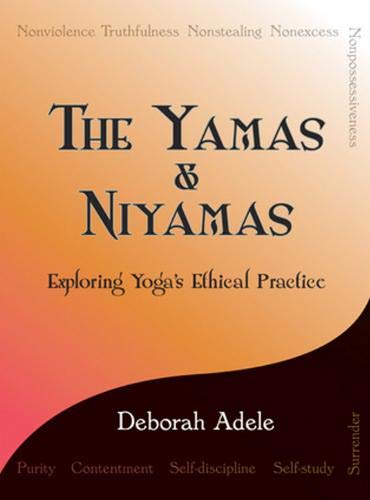In our most recent blogpost, we looked at the concept of non-attachment and the reasons to practice it.
We also addressed how non-attachment is one of the five yamas that, along with the niyamas, comprises the ethical precepts that are the foundation for yogic philosophy.
Don’t worry. We won’t get too deeply into that. Suffice it to say, another of the yamas has to do with not stealing. It is called asteya, and it means much more than not physically taking something that isn’t yours.
It’s much more subtle than that. In fact, according to asteya, there’s a distinct possibility that you’re stealing without knowing it.
Why Do People Steal?
Most of us have at least some lack of faith in ourselves. Some have a bigger lack than others though.
The need to steal basically grows out of this lack. Anytime there is a sense of lack and limitation, it is human nature to start looking for something to fill that empty space. This is the perfect breeding ground for desire, want, and greed.
Soon we may feel as though all of the things that we want, everyone else has. This is an illusion.
What Does It Mean to Not Steal?
Not stealing means more than just respecting what’s yours and what belongs to another – though this is the basis for it. In a nutshell, it’s really about diligently working to stay aware of what is too little and what is too much.

Deborah Adele states it beautifully in her book The Yamas & Niyamas. “It is often hard to know where to draw the line in just where too much lies. Yoga addresses this dilemma beautifully: Gather all the resources you need to support your particular service in the world. No more; no less. In other words, we are asked to walk a fine line between stealing from others and stealing from ourselves.
If we take more than we need, in any area of our lives, we are stealing from others. If we deny ourselves the resources we need to reach our full potential, we are stealing from ourselves.”
Seems easy enough, right? Yet everyday, most of us unconsciously steal from either ourselves or others in the things we say and do. This is not an indictment or a criticism.
It’s just a lack of awareness.
Are You Stealing Without Knowing It?
Once you start recognizing the subtle ways you may be cheating yourself or others, it becomes easier to practice non-stealing. But you have to grasp when you’re doing it in the first place.
There are the obvious examples of stealing. Claiming credit for someone else’s work, for instance. Or “borrowing” items from people and never returning them. Even hoarding is considered stealing because you have far more than you’ll ever need.
But there are less obvious examples including not correcting a clerk when you’re undercharged for goods, or not paying your bills on time. From there, the distinction gets even more subtle.
The following are ways you may be stealing without knowing it.
1. Never Leaving Your Comfort Zone
It’s been said there’s good stuff waiting for you at the exit ramp of your comfort zone. But if you never get there, you’re robbing yourself of undiscovered possibilities.
Sure, staying in your comfort zone is, well, comfortable! But doing so all the time restricts your progress and growth and denies you of your potential.

There’s something to be said for chasing your infinite potential. It not only makes you a better version of yourself, but it uplifts the people around you.
In essence, if you never step out of your comfort zone, you’re denying yourself your dreams and stealing the opportunity for others to be uplifted by your efforts.
2. Constantly Worrying About the Future or the Past
There’s a reason that so many spiritual practices focus on staying in the moment. If you spend a great deal of time dwelling in the past or obsessively worrying about the future, you’re robbing yourself of the beauty and joy of the moment.

For many of us, worrying about the future seems like a form of control. In reality, it can drive you to plan to the point of distraction – setting you up for failure when things don’t go as perfectly as planned. All the while, you’ll be missing the big picture.
Meanwhile, obsessing over memories and getting caught up in guilt and regret is the perfect recipe for denying yourself the happiness that exists in the moment.
3. Judging
Humans are tribal by nature. So our ability to judge evolved to help us recognize who was an asset and who was potentially dangerous. While we still need some form of this, it is not the useful skill it once was.
In fact, it’s a huge cause of divisiveness. And these days, that’s something we could ALL be spared.
Yet, many of us carry on from day to day labeling the guy in the car in front of us or the woman out walking on the sidewalk. Rather than see them as a whole and feeling individual with whom we can relate, we push them away. We rob ourselves of the connection.
What’s equally as troubling is how often we do this to ourselves. We can’t even see the inherent beauty and infinite potential in ourselves. And that’s the ultimate form of thievery.
Scientific studies even show that being non-judgmental can lead to lower levels of anxiety, depression, and stress-related illnesses. That seems like more than reason enough to let go of judgmental behavior.
Of course, that’s our judgment…

Could You Benefit From Practicing Non-Stealing?
The short answer is yes!
But it’s not always easy to recognize when we’re stealing without knowing it. So let us help.
Contact us today to find out how we can bring life coaching and mindfulness practices like yoga and mediation to your corporation, school, or organization. We offer both on-site and virtual sessions to accommodate your needs.
We’ll guide you on how to put your attention into feeling happy rather than envious, jealous, or desirous.



